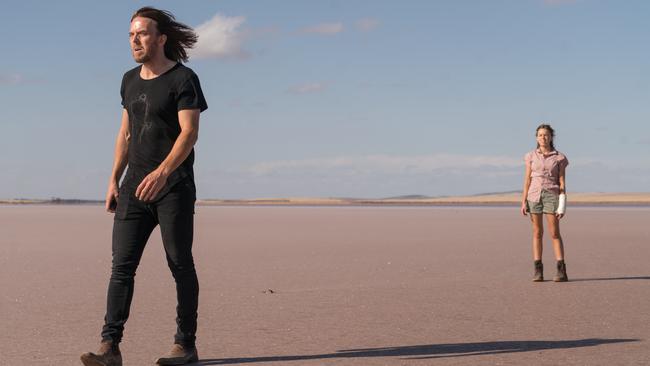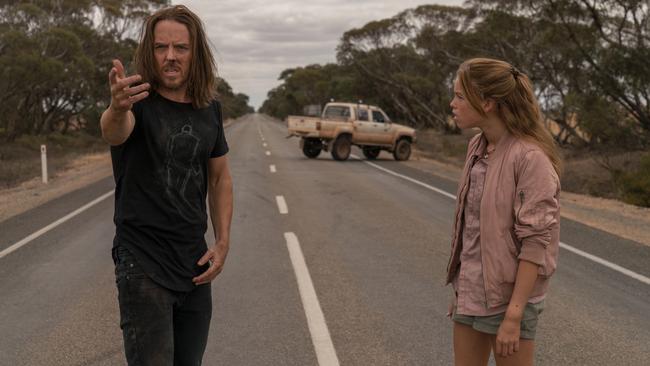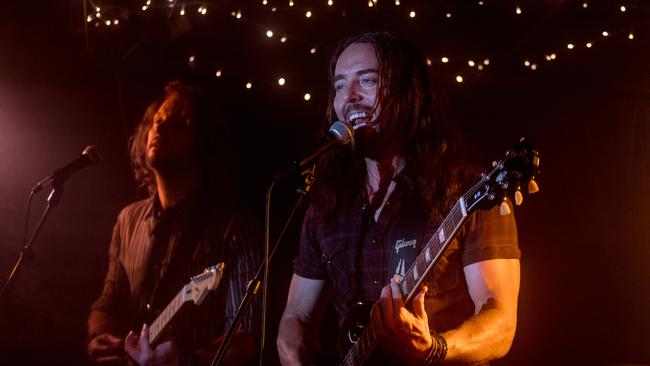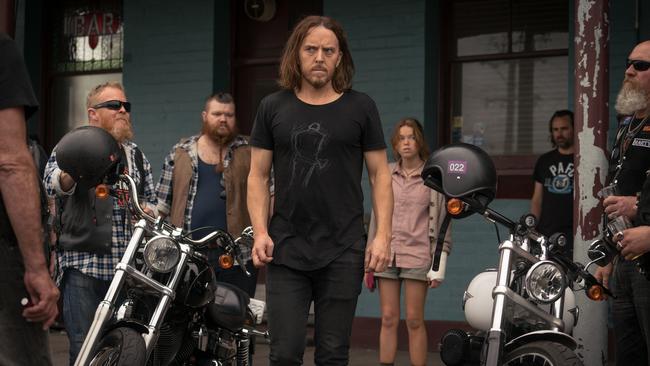At least upright and breathing is a good start
A rollicking roadtrip drama by The Chaser’s Chris Taylor sees two lost souls confront their past.

Upright is a wonderful vehicle for the talented Tim Minchin, of Matilda the Musical fame, who as usual in the beguiling half-hour series has his creative fingers in every pie, producing, writing, and acting — and there may even be the chance of a song as the story develops. Please Like Me’s Matthew Saville directs in his usual suave and empathetic fashion and the drama was created by The Chaser’s Chris Taylor, who is joined on the writing team by Minchin, Kate Mulvany (Lambs of God) and Leon Ford (Offspring); the accomplished Mulvany and Ford are old friends and colleagues of Minchin’s.
Minchin provides the music for the series and is one of the executive producers along with Penny Win and Helen Bowden. The series comes from Lingo Pictures, which also produced the acclaimed series Lambs of God, and was initially filmed in Adelaide, before production shifted to Kalgoorlie and on to Perth.

Upright is a kind of eight-episode buddy road movie, part comedy and part character drama — Minchin calls it “a total heart story while people are laughing all the time” — with a slightly serendipitous beginning. According to the production notes, Taylor had the idea for Upright when he was waiting for a flight at a US airport and stumbled across a news article about a man who was travelling around America with a piano. Because the wi-fi was so bad at the airport, none of the pictures loaded. “So I only had the story. I thought he must have been playing at places like the Grand Canyon … Turns out he was playing in malls in places like Nashville and San Francisco, but the original image in my mind of a piano in a dramatic location was really arresting and I started to think about the idea of a guy who travels across Australia with nothing but an upright piano … a man, down on his luck, a single upright piano, in the Australian desert.”
It’s an inspired idea and when Minchin came on board Taylor’s pitch gathered a greater autobiographical dimension with Minchin’s early involvement in scripting allowing much of the central character to be based around his own experiences. “This is a hypothetical,” he says of the final product. “What if rather than getting lucky and getting to write theatre in London … I’d had something bad happen, or had made a terrible mistake.”
Upright opens with a car hurtling along a country highway carrying a trailer covering some large object with a flapping, black tarpaulin. There’s a long-haired ravaged-looking gent driving, Minchin cursing at the music blaring from the radio and trying to avoid messages appearing on his phone warning him to hurry and not to “f..k” it up. It soon becomes clear that 40-year-old Lucky — we learn his name later — who is seemingly just holding on to some kind of drug dependency, is broke, both financially and in spirit. He’s on the road to Perth, driving somewhat haphazardly, muttering and swearing to himself behind the wheel.

He’s been living the itinerant life of a muso in Sydney for eight years, his only possession it appears is on the back of the trailer behind his battered rental car: the old upright piano to which he is obviously compulsively attached. Then fate intervenes in Lucky’s life when he’s hit from behind by a grimy white HiLux ute and knocked off the road, putting his car out of action. The other driver is runaway 16-year-old Meg, played by Milly Alcock, older than her years, belligerent, manipulative and wonderfully profane. We soon learn, like Lucky, she’s running from her past.
Her arm is bruised and they must drive to Mildura, about an hour away, for medical attention. So against his better judgment, he drives her in the ute, somehow with her worldly assistance — she knows far more about the ways of cars and possibly the world than he does — managing to load the piano on to the back.
There’s something oddly biblical about the way this upright carries such meaning for Lucky, as if it’s his cross and he’s carting it with such obsessive commitment to atone for his sins. (“You don’t see him playing it — he’s not a show guy,” Minchin says. “It feels like a burden and as the series goes on you realise how much it does act as a kind of metaphor for this huge weight he’s carrying.”)
When Meg asks him why he’s going all that way across Australia, he tells her simply: “I don’t have a choice.” A fast montage sequence reveals he’s burnt his friends and old lovers off; no one seems to care and certainly no one will lend him money again. Already as an audience we question the implications raised by the title — just what does upright mean?
We learn he’s on the road to Perth because his mother is dying of cancer, a video from her reaching him before his phone dies. She’s stoic and amusing, obviously educated and possibly wealthy. “It’s time to come home,” she tells him gently. “Enough is enough.”

A bantering relationship develops between the odd couple as they drive. They are both obviously damaged, their lives in disarray. Meg worriedly jokes he might be a “psycho murderer” because he can’t stand the hard rock music she plays as they drive off. She quickly intuits meaning in their encounter. “I don’t believe in coincidences,” she says. “Everything happens for a reason. Too many things have to happen to make things happen, you know.”
Lucky, who reveals his name is actually Lachlan (“But I’ve always been lucky”), picks up on her quizzical tone and tells her the story of a famous musician, a cellist, killed in England when a stray bale of hay serendipitously rolled down a hill and crushed him.
“Nothing happens for a reason or everything happens for no reason,” he says. It’s a clever and witty sequence — we get to learn something about these mysterious characters and the way they see the world before we really know anything about them.
He tries to steal her truck when she has treatment in Mildura but finds himself bound to this smart-talking kid and eventually they drive off together, both aware there’s something almost cosmically inevitable about the way fate has joined them. “I’m your hay bale,” she says. It’s obvious that this trip will somehow enable them both to come to terms with the history that pursues them.
Not much happens in the first episode; there’s little exposition and the backstories of both characters are still a little elusive, but it’s engrossing and beautifully acted. This is a series with acres of heart. Saville gives these two fine talents plenty of room to find their characters from their first confrontation on the highway, his direction deceptively simple, self-assured and finely controlled, and never drawing attention to itself.
As is so characteristic of the way Saville works, every cut and transition is keenly judged, each moment is held for just the right length, and every shift in tone — and there are many from deadpan wryness, to manic energy to the almost Stoppardian moments of philosophical digression — is expertly traversed. Yet to become a household name, Saville is one of our best directors.
As Minchin says of this journey, what started as “a deliberately seductive package” of five pages has become an eight-episode rollicking road trip as entertaining as it is emotionally addictive.
Upright, Sunday, 8.30pm, Fox Showcase.




To join the conversation, please log in. Don't have an account? Register
Join the conversation, you are commenting as Logout